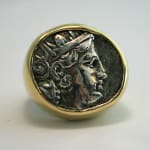Gold Ring with and Athenian Silver Tetradrachm, 490 BCE - 322 CE
Silver and Gold
FJ.5180
During the height of the classical world, no other Greek state rivaled Athens for power, wealth and beauty. The legacy of the Athenian golden age is still found in the...
During the height of the classical world, no other Greek state rivaled Athens for power, wealth and beauty. The legacy of the Athenian golden age is still found in the institution of democracy, in drama and the arts and in the architectural wonders on the acropolis. This splendid silver tetradrachm evokes the glory and grandeur of that unique world. On the front of the coin appears the dramatic image of a helmeted Athena, the ancient Greek goddess of wisdom and war. Athena was the daughter of Zeus, king of the gods. According to myth, her father was suffering from an enormous headache and summoned Hephaistion the blacksmith god to split open his head and relieve the pain. When Hephaistion brought his hammer down on Zeus skull, Athena jumped forth fully grown and wearing a suit of armor. Although important to all the Greek people, Athena’s chief cult was at Athens, the city named for her. Legend has it that she had a contest with Poseidon, god of the sea, for control of the town. It was decided that whichever god gave the most valuable gift to the city would become its patron. Poseidon struck the earth with his trident and a salt spring came forth Athena produced the olive tree, source of ancient Athens greatest commercial wealth, and thereby won the contest. The scenes of her birth and the contest were portrayed on the pediments of the Parthenon, the temple erected in her honor on the acropolis of Athens in the 5th century B.C. On the reverse side of this Athenian coin an owl appears, the ancient symbol of wisdom--one that often accompanies the portrayal of the revered goddess of wisdom, Athena. Framed by a regal gold ring setting, one that befits such an important coin, this radiant work of art truly evidences the glory of ancient Athens, a city that continues to cast its spell upon our senses.



